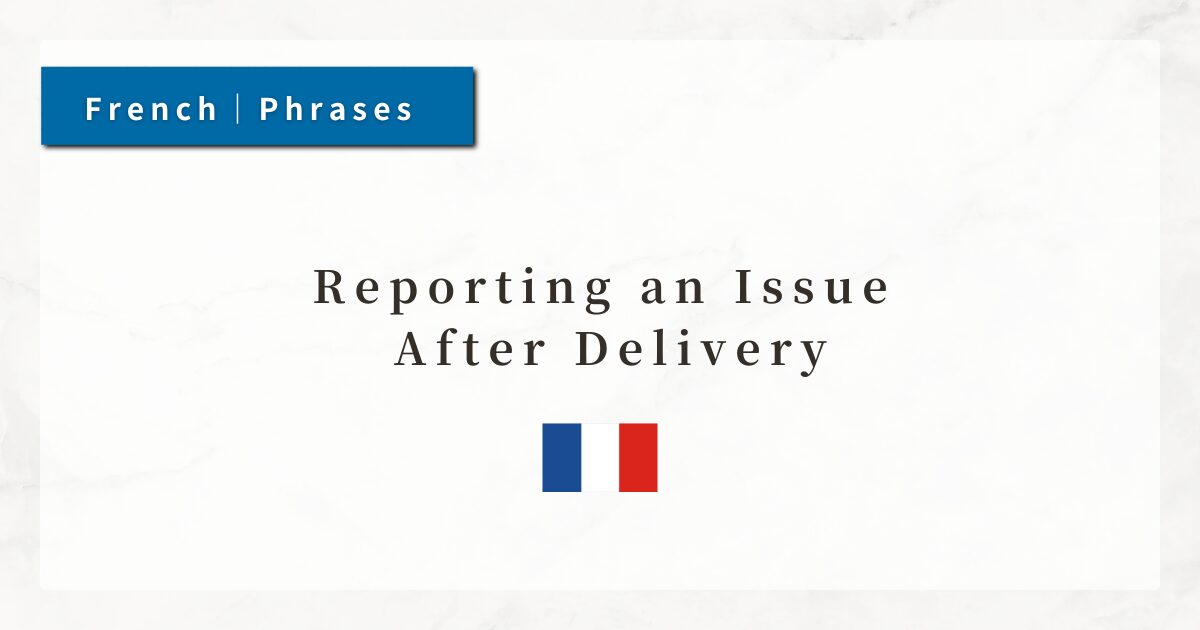#93 Reporting an Issue After Delivery|French Business Phrases

In business, it is not uncommon to find minor errors or issues in a delivered product or file.
In such cases, it is important to communicate the problem calmly, seek the other party’s cooperation, and aim for a positive resolution.
This lesson introduces useful French expressions for reporting issues found after delivery, with sample dialogues and explanations.
Dialogue

Je vous contacte au sujet de la livraison d’hier. Nous avons remarqué un problème dans les fichiers reçus.
(I’m contacting you regarding yesterday’s delivery. We’ve noticed an issue in the files we received.)

Je suis désolé d’entendre cela. Pourriez-vous préciser la nature du problème ?
(I’m sorry to hear that. Could you please specify the nature of the problem?)

Oui, certains documents ne correspondent pas à la dernière version.
(Yes, some documents do not match the latest version.)

Je comprends. Nous allons vérifier immédiatement et vous renvoyer les bons fichiers.
(I understand. We will check right away and send you the correct files.)

Merci beaucoup. Nous apprécions votre réactivité.
(Thank you very much. We appreciate your prompt response.)

C’est normal. Nous ferons le nécessaire pour corriger l’erreur dans les plus brefs délais.
(Of course. We will take the necessary steps to correct the error as quickly as possible.)
1. Politely Reporting the Problem
When an issue occurs, the first step is to explain the situation calmly and clearly. Avoid emotional or vague expressions—state the facts concisely.
- Je vous contacte au sujet de la livraison d’hier.
(I’m contacting you regarding yesterday’s delivery.)
The phrase “au sujet de ~” means “regarding” or “concerning.” It is widely used in both emails and spoken communication.
Using this phrase before mentioning a problem sounds more professional than starting directly with “Il y a un problème.”
Next, clearly indicate that an issue has been found:
- Nous avons remarqué un problème dans les fichiers reçus.
(We’ve noticed a problem in the files we received.)
The verb remarquer means “to notice” or “to observe,” and is a polite way to say that a problem has been detected.
2. Explaining the Issue Clearly
Specify which part of the delivery contains the issue. Keep the explanation short and logical.
- Certains documents ne correspondent pas à la dernière version
(Some documents do not match the latest version.)
The expression “correspondre à ~” means “to correspond to” or “to match.”
Here it conveys that the delivered files are not up to date.
- Le produit ne fonctionne pas comme prévu.
(The product is not functioning as expected.) - Il semble y avoir une erreur dans les données.
(There seems to be an error in the data.)
Using “Il semble~” (it seems that~) allows you to point out a problem without sounding accusatory.
3. Requesting Action Politely
After describing the problem, ask for the necessary follow-up. Always frame your request politely, as a favor rather than a command.
- Pourriez-vous vérifier ce point ?
(Could you please check this point?) - Serait-il possible de nous renvoyer la version corrigée ?
(Would it be possible for you to resend the corrected version?)
Both are standard polite request forms using the conditional mood (Pourriez-vous…, Serait-il possible de…).
These are essential expressions in business communication, not only for troubleshooting but in any formal exchange.
4. Expressing Gratitude for Their Cooperation
When the other party apologizes or responds promptly, always express appreciation. This helps maintain a good business relationship even after a problem occurs.
- Merci pour votre réactivité.
(Thank you for your prompt response.) - Je vous remercie pour votre coopération.
(I sincerely appreciate your cooperation.)
The noun réactivité refers to “responsiveness” or “quick reaction,” a useful word in professional contexts.
5. Phrases for Responding to the Issue Yourself
If you are the one handling the issue, express sincerity and promptness.
- Nous allons vérifier immédiatement.
(We will check immediately.) - Nous ferons le nécessaire pour corriger l’erreur.
(We will take the necessary steps to correct the problem.)
These phrases convey professionalism and responsibility, reassuring your client that the issue will be handled properly.
Summary
- Je vous contacte au sujet de ~
→ Polite way to introduce the topic of delivery or product. - Nous avons remarqué un problème ~
→ State the issue objectively and calmly. - Pourriez-vous vérifier / Serait-il possible de ~
→ Standard polite phrases for requesting confirmation or action. - Merci pour votre réactivité / votre coopération
→ Express appreciation for promptness or cooperation.




